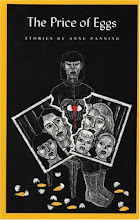 I splurged and bought a hardcover of this book. I wanted a good, sprawling, multi-generational family novel to take with me on our trip to northern Michigan. Despite what the cover suggests, this is not a "beach read," but is in fact a complex, richly layered and character-driven novel. I'm so glad I splurged.
I splurged and bought a hardcover of this book. I wanted a good, sprawling, multi-generational family novel to take with me on our trip to northern Michigan. Despite what the cover suggests, this is not a "beach read," but is in fact a complex, richly layered and character-driven novel. I'm so glad I splurged.First of all, the title: Maine. There's something about the state that holds mystique, allure. What is it exactly? I've only been there once for a week's vacation when my daughter, Lily, was just a toddler and my son, Hudson, was five. We rented a small house on the ocean, and did a lot of chasing after the kids but the real highlight was celebrating my birthday by eating my very own huge lobster on our picnic table, complete with melted butter and bib. Still, Sullivan's Maine is much different here: it's the kind of old-money, family camp style Maine that you want to cozy up in and never leave.
But all is not happy and bucolic, of course. When the three generations of Kelleher women meet at the property one summer, negativity, hushed secrets, sibling rivalry and other tensions abound. Alice, the octogenarian matriarch, drinks far too much and is hatching a plan that will surprise and sadden the whole family. Maggie, Alice's granddaughter, is pregnant and thirty-two with no real prospects on the horizon; Maggie's mother, Kathleen, the black sheep of the family, has moved to California and now operates an organic worm farm. Ann Marie, related to the family through marriage, is the quintessential suburban wife and mother with a crush on her husband's good friend. They all compete, argue, one up, blame, and guilt trip one another as they realize the old and easy days are gone.
What I love about the novel is the way that each character is deeply grounded in particularizing details. Ann Marie is obsessed with dollhouses, and so we get a firsthand look at the culture of miniatures. I was intrigued by the organic composting with worms Kathleen is engaged in, and I was equally taken by the subtle way Alice's Irish Catholic background informs her present decision making.
Idiosyncrasies: Four revolving narrators spanning three generations; the dollhouse convention Ann Marie attends (fascinating look at peoples' obsession with "the small"), the way readers are privy to the novel's "secret," but that three of the four narrators aren't
Favorite line: "Minnie's Minis from Staffordshire made the most gorgeous little cakes, with frosting that looked like real marzipan, and tiny ceramic strawberries on top, each berry no bigger than the head of a pin. A slice of cake could be removed to show the chocolate and raspberry filling inside."
Bottom line: A rich and elegant novel with the beautiful setting of Maine that invokes a longing for the past and questions the durability of family ties



.jpg)